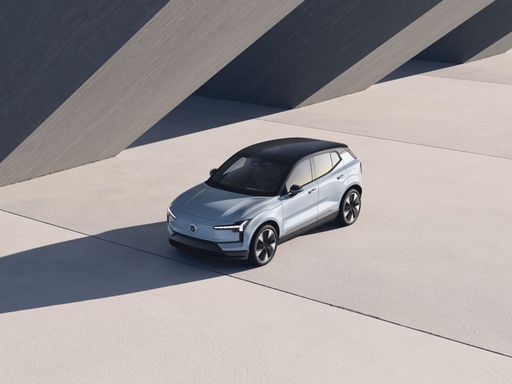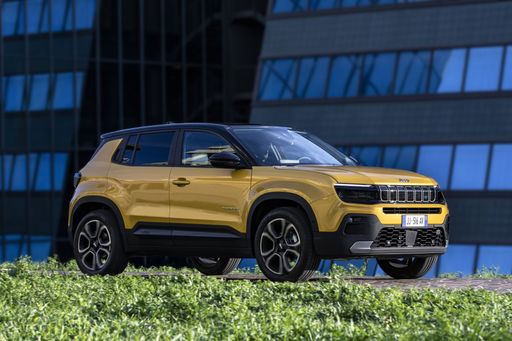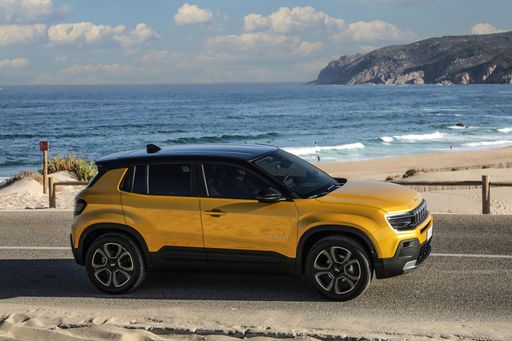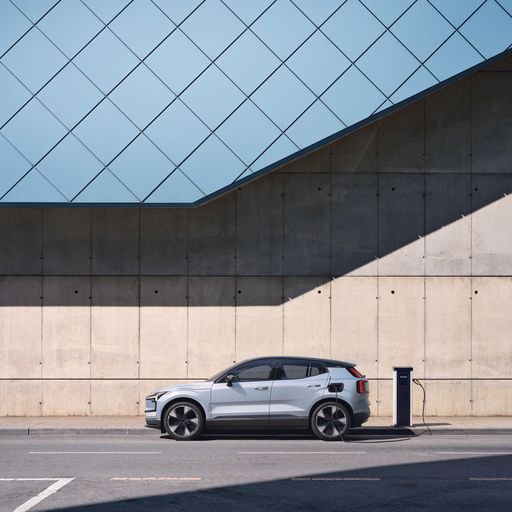Jeep Avenger vs Volvo EX30 - Differences and prices compared
Compare performance (156 HP vs 428 HP), boot space and price (21900 £ vs 33000 £ ) at a glance. Find out which car is the better choice for you – Jeep Avenger or Volvo EX30?
Costs and Efficiency:
Price and efficiency are often the first things buyers look at. Here it becomes clear which model has the long-term edge – whether at the pump, the plug, or in purchase price.
Jeep Avenger has a clearly advantage in terms of price – it starts at 21900 £ , while the Volvo EX30 costs 33000 £ . That’s a price difference of around 11049 £.
In terms of energy consumption, the advantage goes to the Jeep Avenger: with 15.50 kWh per 100 km, it’s slight more efficient than the Volvo EX30 with 17 kWh. That’s a difference of about 1.50 kWh.
As for electric range, the Volvo EX30 performs to a small extent better – achieving up to 476 km, about 76 km more than the Jeep Avenger.
Engine and Performance:
Power, torque and acceleration say a lot about how a car feels on the road. This is where you see which model delivers more driving dynamics.
When it comes to engine power, the Volvo EX30 has a significantly edge – offering 428 HP compared to 156 HP. That’s roughly 272 HP more horsepower.
In acceleration from 0 to 100 km/h, the Volvo EX30 is decisively quicker – completing the sprint in 3.60 s, while the Jeep Avenger takes 9 s. That’s about 5.40 s faster.
In terms of top speed, the Jeep Avenger performs barely noticeable better – reaching 194 km/h, while the Volvo EX30 tops out at 180 km/h. The difference is around 14 km/h.
There’s also a difference in torque: Volvo EX30 pulls convincingly stronger with 543 Nm compared to 260 Nm. That’s about 283 Nm difference.
Space and Everyday Use:
Beyond pure performance, interior space and usability matter most in daily life. This is where you see which car is more practical and versatile.
Both vehicles offer seating for 5 people.
In curb weight, Jeep Avenger is decisively lighter – 1180 kg compared to 1840 kg. The difference is around 660 kg.
In terms of boot space, the Jeep Avenger offers to a small extent more room – 380 L compared to 318 L. That’s a difference of about 62 L.
In maximum load capacity, the Jeep Avenger performs noticeable better – up to 1277 L, which is about 277 L more than the Volvo EX30.
When it comes to payload, Jeep Avenger clearly perceptible takes the win – 502 kg compared to 390 kg. That’s a difference of about 112 kg.
Who wins the race in the data check?
The Volvo EX30 is decisively ahead in the objective data comparison.
This result only shows which model scores more points on paper – not which of the two cars feels right for you.
Costs and Consumption
View detailed analysis
Engine and Performance
View detailed analysis
Dimensions and Body
View detailed analysis

Volvo EX30
Jeep Avenger
The Jeep Avenger shrinks Jeep's boxy, adventurous styling into a city-friendly electric crossover that looks just as at home on tight streets as it does on muddy weekend lanes. It's a savvy pick for drivers who want go-anywhere attitude without the truck-size ego — practical inside, lively around town and ready to tackle a bit of rough stuff when the mood strikes.
details




Volvo EX30
The Volvo EX30 arrives as a compact electric with crisp Scandinavian design and a cheeky personality, proving you can be serious about safety and still enjoy a grin on your commute. Its cabin is cleverly packaged and delightfully easy to live with, offering smart tech and practical touches that make it feel like a grown-up's city car with a sense of fun.
details




Costs and Consumption |
|
|---|---|
|
Price
21900 - 36900 £
|
Price
33000 - 49100 £
|
|
Consumption L/100km
4.9 - 5.7 L
|
Consumption L/100km
-
|
|
Consumption kWh/100km
15.50 kWh
|
Consumption kWh/100km
17 - 18.7 kWh
|
|
Electric Range
400 km
|
Electric Range
339 - 476 km
|
|
Battery Capacity
51 kWh
|
Battery Capacity
49 - 65 kWh
|
|
co2
0 - 129 g/km
|
co2
0 g/km
|
|
Fuel tank capacity
44 L
|
Fuel tank capacity
-
|
Dimensions and Body |
|
|---|---|
|
Body Type
SUV
|
Body Type
SUV
|
|
Seats
5
|
Seats
5
|
|
Doors
5
|
Doors
5
|
|
Curb weight
1180 - 1520 kg
|
Curb weight
1840 - 1960 kg
|
|
Trunk capacity
325 - 380 L
|
Trunk capacity
318 L
|
|
Length
4084 - 4088 mm
|
Length
4233 mm
|
|
Width
1776 mm
|
Width
1838 mm
|
|
Height
1527 - 1541 mm
|
Height
1550 - 1567 mm
|
|
Max trunk capacity
1218 - 1277 L
|
Max trunk capacity
1000 L
|
|
Payload
494 - 502 kg
|
Payload
370 - 390 kg
|
Engine and Performance |
|
|---|---|
|
Engine Type
Electric, Petrol, Petrol MHEV
|
Engine Type
Electric
|
|
Transmission
Automatic, Manuel
|
Transmission
Automatic
|
|
Transmission Detail
Reduction Gearbox, Manual Gearbox, Dual-Clutch Automatic
|
Transmission Detail
Reduction Gearbox
|
|
Drive Type
Front-Wheel Drive, All-Wheel Drive
|
Drive Type
Rear-Wheel Drive, All-Wheel Drive
|
|
Power HP
100 - 156 HP
|
Power HP
272 - 428 HP
|
|
Acceleration 0-100km/h
9 - 10.6 s
|
Acceleration 0-100km/h
3.6 - 5.7 s
|
|
Max Speed
150 - 194 km/h
|
Max Speed
180 km/h
|
|
Torque
205 - 260 Nm
|
Torque
343 - 543 Nm
|
|
Number of Cylinders
3
|
Number of Cylinders
-
|
|
Power kW
74 - 115 kW
|
Power kW
200 - 315 kW
|
|
Engine capacity
1199 cm3
|
Engine capacity
-
|
General |
|
|---|---|
|
Model Year
2023 - 2025
|
Model Year
2024 - 2025
|
|
CO2 Efficiency Class
A, D, C
|
CO2 Efficiency Class
A
|
|
Brand
Jeep
|
Brand
Volvo
|
What drivetrain options does the Jeep Avenger have?
Available configurations include Front-Wheel Drive or All-Wheel Drive.




